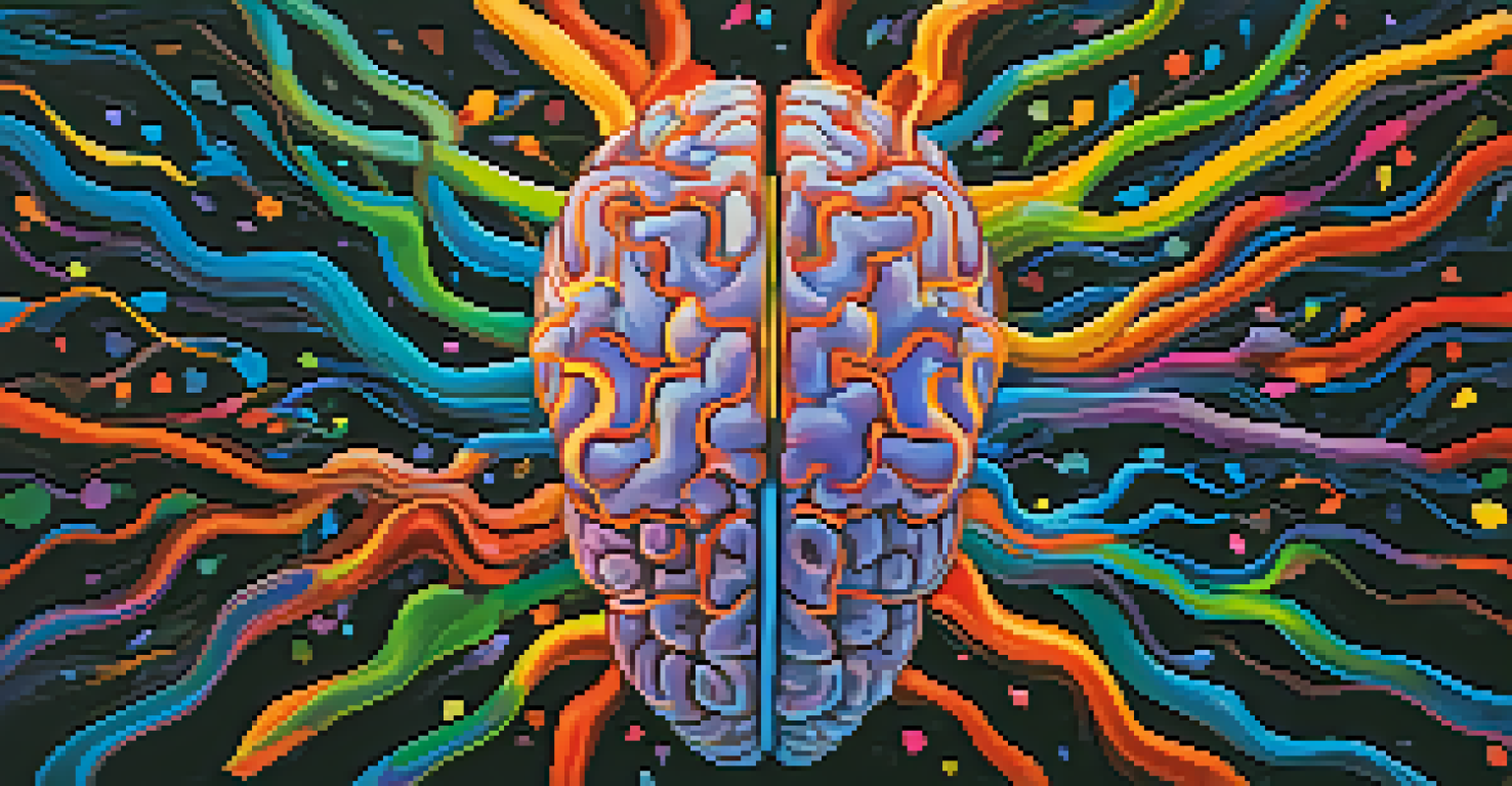Integrating Psychedelic Therapy into Conventional Treatment Plans

Understanding Psychedelic Therapy and Its Benefits
Psychedelic therapy involves using substances like psilocybin or MDMA to enhance mental health treatment. These substances can help unlock emotional barriers and provide profound insights during therapy sessions. Many patients report significant breakthroughs in understanding their trauma and mental health struggles.
Psychedelics can help unlock emotional barriers and provide profound insights during therapy sessions.
Research has shown that psychedelics can promote neuroplasticity, allowing the brain to form new connections and pathways. This can be particularly beneficial for individuals dealing with depression, anxiety, or PTSD. By integrating these therapies into existing treatment plans, practitioners can offer a more holistic approach to mental health care.
Additionally, the therapeutic journeys facilitated by psychedelics often lead to enhanced emotional resilience. Patients may find that their ability to cope with stress and anxiety improves significantly after undergoing psychedelic therapy, making it a valuable complement to conventional methods.
The Role of Psychedelics in Treating Mental Health Disorders
Psychedelics have shown promise in treating various mental health disorders, including depression, anxiety, and PTSD. For instance, studies have demonstrated that patients with treatment-resistant depression often experience relief after just a few sessions with psychedelics. This opens the door to new possibilities for individuals who have exhausted traditional treatment options.

Moreover, the unique experiences induced by psychedelics can help patients confront and process deep-seated emotions and traumas. This process often leads to a greater understanding of their mental health, which can be a cornerstone of effective treatment. The integration of psychedelic therapy can thus enhance the efficacy of psychotherapy.
Psychedelics Aid Mental Health
Psychedelic therapy can significantly enhance treatment for mental health disorders by promoting neuroplasticity and emotional resilience.
As more research emerges, healthcare professionals are beginning to recognize the value of incorporating psychedelics into treatment plans. This shift not only reflects a growing acceptance of these substances but also highlights the need for a more comprehensive approach to mental health care.
Combining Psychedelic Therapy with Talk Therapy
One of the most effective ways to integrate psychedelic therapy is by combining it with traditional talk therapy. This approach allows patients to explore their experiences in a safe environment, guided by a trained therapist. The combination can deepen the therapeutic process and enhance emotional healing.
The therapeutic journey facilitated by psychedelics often leads to enhanced emotional resilience.
During these sessions, patients often report heightened emotional awareness and clarity. This newfound perspective can facilitate discussions during follow-up therapy sessions, helping patients articulate their feelings and experiences more effectively. The synergy between the two modalities can lead to transformative outcomes.
Furthermore, integrating psychedelic therapy with talk therapy can help reinforce the therapeutic relationship, fostering trust and openness. This bond is crucial for effective treatment, as it allows patients to explore difficult topics without fear of judgment.
Challenges of Integrating Psychedelic Therapy
While the potential benefits of psychedelic therapy are promising, several challenges must be addressed for successful integration. One major hurdle is the legal status of many psychedelics, which can vary widely by location. This creates barriers for practitioners looking to incorporate these therapies into their practices.
Additionally, not all therapists are trained to work with psychedelics, leading to a knowledge gap in the mental health field. Training programs and resources need to be developed to equip therapists with the skills necessary to facilitate psychedelic experiences safely and effectively. Without proper training, the risks may outweigh the benefits.
Integrating Therapies for Success
Combining psychedelic therapy with traditional talk therapy fosters deeper emotional healing and reinforces the therapeutic relationship.
Finally, there is still a stigma surrounding the use of psychedelics, which can deter patients from seeking this form of therapy. Overcoming this stigma requires education and awareness campaigns to inform the public about the therapeutic potential of psychedelics, fostering a more accepting attitude towards their use.
Ethical Considerations in Psychedelic Therapy
As with any treatment, ethical considerations are paramount when integrating psychedelic therapy. Informed consent is essential, ensuring that patients fully understand the potential risks and benefits. Therapists must be transparent about the therapy process and create a safe space for patients to express their concerns.
Additionally, practitioners should be aware of the potential for misuse or dependency on psychedelics. While these substances can be beneficial, they must be used responsibly and within a controlled therapeutic setting. Regular monitoring and support are vital to ensure that patients remain safe throughout their treatment journey.
Finally, therapists should remain sensitive to the diverse backgrounds and experiences of their patients. Cultural competencies play a significant role in understanding how individuals may perceive and react to psychedelic therapy, ensuring that the approach is respectful and inclusive.
Research and Future Directions in Psychedelic Therapy
The field of psychedelic therapy is rapidly evolving, with ongoing research shedding light on its potential applications. Clinical trials are increasingly demonstrating the efficacy of psychedelics in treating various mental health disorders, paving the way for broader acceptance in the medical community. This growing body of evidence is crucial for legitimizing psychedelic therapy as a viable treatment option.
Moreover, researchers are exploring innovative ways to combine psychedelics with other therapeutic modalities, such as mindfulness or cognitive-behavioral therapy (CBT). These integrative approaches may enhance treatment outcomes and provide patients with comprehensive support throughout their healing process.
Challenges in Psychedelic Therapy
Legal barriers, training gaps, and stigma present challenges to the effective integration of psychedelic therapy into mental health care.
As more data emerges, it is likely that regulatory frameworks will evolve to accommodate the safe and responsible use of psychedelics in therapy. This will require collaboration among researchers, practitioners, and policymakers to ensure that the benefits of psychedelic therapy can be harnessed effectively.
Patient Experiences: Testimonials and Case Studies
Hearing from patients who have undergone psychedelic therapy can provide valuable insights into its impact. Many individuals report life-changing experiences, describing feelings of clarity, emotional release, and profound self-discovery. These testimonials highlight the potential of psychedelics to facilitate healing in ways traditional therapies may not achieve.
For instance, some patients with PTSD have shared how a single session of psychedelic therapy allowed them to confront traumatic memories, leading to significant reductions in their symptoms. These powerful stories underscore the transformative nature of these experiences and the hope they bring to those struggling with mental health issues.

Sharing patient experiences can also help reduce stigma and encourage others to seek help. By showcasing the positive outcomes of psychedelic therapy, we can foster a more open conversation about mental health treatment options and empower individuals to explore new avenues for healing.